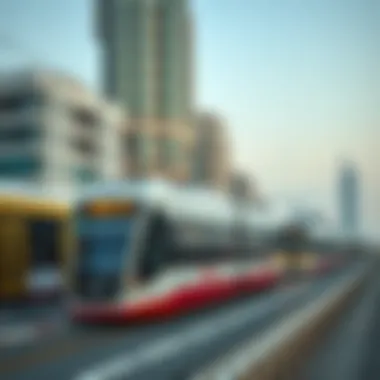Understanding Living and Investment Costs in Dubai


Intro
Living and investing in Dubai has become an enticing proposition for many around the globe, drawing individuals and entrepreneurs like moths to a flame. Known for its lavish lifestyle and diverse culture, the city also presents its own set of intricacies in terms of cost. As with any major metropolis, understanding the financial landscape is crucial, from housing to daily expenses, and even investment opportunities lurking beneath the surface.
In this article, we will explore the numerous dimensions of living and investing in Dubai. Our journey will navigate through the currents of market insights and investment strategies that could either pave your pathway to prosperity or lead you astray, depending on your decision-making.
Let’s roll up our sleeves and dig into the nitty-gritty of these costs, providing both a broad overview and valuable details that will aid in making informed choices.
Market Insights
Current Market Trends
In the past few years, Dubai's real estate market has been experiencing a noteworthy transformation. Prices have fluctuated, but there's a gradual upward trend in both property demand and investment interest. The allure of high returns on investment lures in global investors, particularly from regions seeking safer havens for their wealth.
Current statistics show that rental properties, especially in prime areas like Downtown Dubai or Dubai Marina, have seen increased interest. This is fueled by the affordable pricing compared to major global cities like London or New York, coupled with a tax-free residency for expatriates. Moreover, there’s a growing trend towards sustainable and smart buildings, as the city aims to improve living standards and push for a greener future.
"A sound understanding of the current market trends leads to smarter investments and better living scenarios."
Future Projections
Projecting the future of Dubai’s market remains a tricky yet fascinating task. Experts broadly agree that, given the city's ongoing developments, including the Dubai Expo momentum and an ever-growing population, there will likely be a continued increase in property value. While this might appear overly optimistic, historical patterns reveal that Dubai tends to bounce back well after downturns, often with renewed vigor.
Additionally, upcoming infrastructure projects, like the extension of the metro line and new residential communities, are poised to bolster the property appeal. The anticipated increase in tourism due to various global events also significantly impacts the market.
Investment Strategies
Best Practices for Buying Luxury Property
When it comes to navigating the waters of luxury property investment in Dubai, there are quite a few key strategies to consider:
- Thorough Research: Understand the local market nuances and the history of the neighborhood.
- Engage a Local Expert: Work with a reputable real estate agent who has a comprehensive knowledge of the market.
- Consider Off-Plan Properties: Investing in properties that are yet to be built can often provide substantial discounts and favorable payment plans.
Ultimately, it’s paramount to ensure that your investment aligns not only with market trends but also with your personal objectives.
Rental Yield Insights
Rental yields in Dubai can vary widely depending on the location and type of property. Generally, areas like Dubai Marina and Jumeirah Beach Residence boast higher rental yields, averaging between 6% and 8%. However, suburban areas may present opportunities as they embrace population growth and infrastructural development.
To make the most of rental investments, consider:
- Evaluating Location: Proximity to amenities, schools, and transportation hubs.
- Conducting Comparisons: Benchmark similar properties and analyse what sets yours apart.
- Long-term Strategies: Focus not just on immediate returns, but on the potential growth of property value over time.
By carefully analyzing these insights and strategies, investors can navigate the Dubai market effectively, paving the way for successful investment ventures.
The Comprehensive Costs of Living in Dubai
Understanding the costs of living in Dubai is vital for anyone considering making this vibrant city their home or investment ground. From expatriates to seasoned investors, a clear grasp of the financial landscape allows individuals to plan effectively and avoid any financial pitfalls. Dubai, often dubbed the jewel of the Middle East, boasts a unique blend of luxury and affordability. However, it’s crucial to navigate these waters with due diligence to ensure financial stability and fruitful returns.
Housing Costs: Renting vs. Buying
Housing in Dubai can vary widely based on location, type of property, and market conditions. Renting a property might appear more feasible initially, especially for newcomers. Prices fluctuate monthly, with areas like Dubai Marina and Downtown often commanding a premium. The average cost to rent a one-bedroom in said areas can hover around AED 80,000 annually, whereas further out in areas like Dubai Silicon Oasis, you might get a similar property for AED 50,000. On the flip side, purchasing property can be an attractive long-term investment. However, buyers must account for substantial upfront costs, such as a minimum 25% down payment for expatriates—higher for the locals.
The buying process can be a bit of a maze, especially for first-timers, with considerations like title deed fees and property registration charges. Prospective buyers often grapple with the question: is it better to rent or buy? Ultimately, individual circumstances, market conditions, and long-term plans dictate the best choice.
Utility Expenses: What to Expect


When it comes to utilities, residents in Dubai can expect several monthly costs stemming from electricity, water, internet, and cooling. The typical utility cost can range from AED 600 to AED 1,200 for a standard apartment, depending on usage, size, and the efficiency of air conditioning, which plays a massive role in the summer months.
Residents are often surprised that summer months can double or even triple utility bills due to extensive reliance on air conditioning. It's essential to budget realistically for these expenses and, where possible, employ energy-efficient appliances to help manage costs.
Food and Grocery Expenses
Eating out in Dubai can be a feast for the senses, but it can also be a strain on the wallet. The price of meals can range significantly—from affordable eateries serving traditional dishes at around AED 40 to luxury restaurants charging hundreds for a single dish. For those keen on cooking at home, grocery expenses vary by preference. Basic staples like rice, bread, and milk are relatively inexpensive, yet imported goods can carry hefty price tags, influencing total monthly expenses, which can add up to AED 1,500 to AED 2,500 for a family of four.
As with many cities, understanding local shopping habits and markets can lead to savings.
Healthcare Costs: Access and Affordability
Dubai’s healthcare system is robust, boasting high-quality medical facilities. However, the costs can be a rude awakening for some. Health insurance is a must, with yearly premiums that can vary widely based on coverage levels, typically costing between AED 7,000 to AED 15,000 per person. Expatriates often find themselves navigating different policies, especially since certain treatments may not be covered fully.
Access to private clinics is abundant and prompt, yet it comes with a price. Routine checks and minor treatments can unexpectedly dig deep into one’s pocket if insurance isn't adequately understood.
Transportation Costs: Public and Private Options
The transportation landscape in Dubai offers a rich array of options for getting around. While many residents opt for personal vehicles, the introduction of the metro system has drastically increased public transport's attractiveness. Metro fares cost roughly AED 3 to AED 7 depending on the journey length, making it a sensible choice for daily commuters.
On the other hand, if you choose the private route and require a car, budgeting for fuel, insurance, and maintenance becomes crucial—fuel prices are reasonable, yet insurance can fluctuate based on the vehicle and driver profile.
Educational Expenses in Dubai
For families, education is often a significant factor in deciding to reside in Dubai. The city is home to a myriad of international schools, each with its own fee structure. Annual tuition can soar to AED 100,000 or more for private schooling, while public schools cater primarily to Emirati students. It’s wise for parents to explore all options, weighing quality against cost to find a suitable balance for their children.
Lifestyle Expenses: Leisure and Entertainment
Dubai is synonymous with luxury and leisure. Whether it’s soaking in the lavishness of resorts or attending first-rate cultural events, the options are endless. Yet, these luxuries come at a price. Monthly leisure expenses can range widely. Sports enthusiasts often pay for gym memberships ranging from AED 200 to AED 1,500, while dining out and entertainment can easily push monthly expenses significantly higher.
The key to managing lifestyle expenses is finding a mix of occasional splurges balanced with everyday activities that fit your budget. Paying attention to local events and offers can help in reducing these costs greatly, allowing for an enjoyable lifestyle without compromising financial stability.
Moving to a new city isn't just about finding a nice place to live; it's about understanding the financial landscape and making informed decisions.
In summary, understanding the comprehensive costs of living in Dubai is crucial for anyone thinking about long-term residency or investment. Being aware of housing, utility, food, healthcare, transportation, education, and lifestyle expenses paves the way for a smoother transition into life in this iconic city.
Understanding Dubai's Real Estate Market
To grasp the intricacies of living or investing in Dubai, one must delve into the realm of its real estate market. This segment isn’t merely a study of bricks and mortar—it's about understanding the dynamics that drive a metropolis known for its rapid development and opulent lifestyle. By comprehending the nuances of this market, potential investors or residents can navigate their choices with confidence and foresight.
The real estate landscape of Dubai is characterized by a unique blend of opportunities and challenges. Given the city’s global standing and diverse expat population, knowing the local market trends and types of properties available becomes essential. This awareness not just empowers informed decisions but also includes an understanding of the legal considerations and financial options available in the Emirate.
Current Market Trends
In the ever-evolving nature of Dubai’s real estate market, staying updated on current trends is pivotal. Recently, there's been a marked increase in demand for residential properties, driven by a surge in population and tourism. Investment opportunities are particularly sizzling, with luxury apartments and villas across various districts experiencing a spike in interest.
- Growth in Affordable Housing: There's a notable push towards affordable housing options, as the government encourages social development. More projects are catering to middle-income families, making it viable for many to settle here.
- Sustainable Living: The emphasis on sustainability has influenced property development, reflecting in eco-friendly designs and energy-efficient buildings. This trend aligns with Dubai's vision to promote greener living spaces, attracting eco-conscious investors.
- Post-Pandemic Recovery: The market is witnessing a bounced back from the pandemic’s initial hiccups, showcasing resilience with steady price stability and an influx of foreign investments.
Types of Properties Available
Understanding the diverse classifications of property available is crucial for potential investors. Dubai offers numerous options, each catering to different needs and budgets:
- Residential Properties: These include apartments, villas, and townhouses. Popular communities like Dubai Marina and Palm Jumeirah boast luxurious living spaces, while areas like Jumeirah Village Circle offer more affordable options.
- Commercial Properties: With a booming business landscape, commercial real estate also thrives. Office spaces, warehouses, and retail units in prime areas like Downtown Dubai hold significant value.
- Mixed-Use Developments: Properties designed for both residential and commercial use are becoming increasingly popular, fostering convenience and community living. These developments often feature retail shops within residential complexes, allowing for a vibrant lifestyle.
Key Areas for Investment
Certain hotspots in Dubai particularly shine as investment havens due to their strategic location and amenities. Here are some of the key areas:


- Downtown Dubai: Known for iconic landmarks like the Burj Khalifa and the Dubai Mall, properties here enjoy high demand. It’s a prime spot for luxury buyers looking for prestige and return on investment.
- Dubai Marina: This area is favored for its picturesque waterfront views and vibrant nightlife. Properties in Dubai Marina attract both residents and tourists, ensuring steady rental yields.
- Business Bay: As Dubai’s commercial heart, Business Bay houses corporate headquarters and high-end residential towers. It’s an area with immense growth potential, appealing to both investors and expatriates seeking urban living.
- Jumeirah Lake Towers (JLT): Offering more affordable options, JLT is popular among young professionals and families alike, ensuring vibrant community life and competitive pricing.
The Dubai real estate market thrives on its dramatic blend of luxury, location, and lifestyle, making it an attractive avenue for those looking to invest or reside.
The Investment Landscape in Dubai
When exploring the costs of living and investing in Dubai, it’s critical to peel back the layers of the investment landscape. This section sheds light on the myriad facets that define how potential buyers and investors can navigate this vibrant market. With Dubai's economy firmly rooting itself in global dynamism, understanding its investment landscape unveils opportunities for both experienced investors and newcomers alike.
Investment Strategies for Buyers
Investors must consider various strategies to make informed decisions in Dubai's real estate market. An adaptable approach is essential, as market conditions can shift quickly. Here are some effective strategies:
- Buy and Hold: This classic strategy appeals to those looking for long-term gains. By purchasing a property in a desirable location, one can benefit from future price appreciation and rental income. Popular neighborhoods like Dubai Marina or Jumeirah Heights often yield good returns over time.
- Flip Properties: For the more daring investor, flipping properties can lead to substantial profit, especially when purchasing undervalued homes or off-plan units. However, this requires thorough market research and a discerning eye for potential.
- Diversifying Portfolios: Investing in a mix of residential and commercial properties is advantageous. This spread mitigates risk, as commercial investments often yield higher returns compared to residential options.
The cornerstone of any successful investment strategy is market research. Keeping abreast of property trends and upcoming developments can steer investment decisions in the right direction.
Financing Options and Legal Considerations
Navigating through financing options in Dubai can feel like walking through a maze. Multiple paths can lead to securing the right investment, and it’s crucial to understand the legal framework governing property investments in the emirate. Investors should consider the following aspects:
- Mortgage Availability: Banks in Dubai offer various mortgage options tailored to both expatriates and UAE nationals. Typically, expats can borrow up to 75% of the property's value, while locals may obtain a little more. Knowing the right lenders and their terms can give buyers better leverage.
- Legal Procedures: It’s paramount to be aware of the legal processes involved. Engaging a reputable real estate lawyer who understands local laws can help tremendously. They can offer advice on contracts, property registration, and the nuances of foreign ownership laws.
- Due Diligence: Before sealing the deal, conducting thorough due diligence on the property is vital. Checking for outstanding debts, verifying ownership, and the legality of the title deed can save significant headaches down the road.
Understanding these financing options and associated legal considerations positions investors to navigate the market with confidence.
Rental Yields and Market Opportunities
With a booming population and a steady influx of expatriates, the rental market in Dubai is thriving. Investors often seek high rental yields, and several factors influence these enticing returns:
- Location is Key: Properties in areas such as Downtown Dubai or Dubai South tend to attract higher rental demand due to their proximity to business hubs and entertainment options. This highlights the importance of location in investment decisions.
- Market Research: Investors should monitor rental trends to identify optimal times to purchase properties. Monthly rental prices can fluctuate based on seasonal demand and upcoming developments, so staying attuned to these changes is crucial.
- Attractive Incentives: The Dubai government often offers various incentives to lure investors, such as freehold titles, which allows foreigners to own property outright, and favorable visa conditions that may apply to buyers. These factors enhance market opportunities.
Investing in Dubai is not just about buying property; it’s about understanding a unique market and its cultural underpinnings.
For further insights into Dubai’s ever-changing real estate scene, visit Dubai Land Department and engage with community forums like Reddit Real Estate.
Comparative Analysis: Dubai vs. Other Global Cities
Conducting a comparative analysis of the costs associated with living and investing in Dubai against other global cities is not just an academic exercise; it's a practical approach that enlightens potential investors, homeowners, and even expatriates about the nuances of the economic landscape. As investors or individuals embark on a journey towards establishing roots in Dubai, understanding where this vibrant metropolis stands against cities like New York, London, or Singapore becomes crucial. This section thus sheds light on key metrics that emphasize the pros and cons of making the move to Dubai.
Understanding these comparisons helps to clarify how Dubai balances both affordability and luxury. For instance, you might find that housing costs in Dubai might be higher than in some parts of Europe but significantly more reasonable than in the heart of Manhattan. Simply put, it’s all about perspective and context—each city has its own flavor and particularities that come into play.
Cost of Living Comparisons
When comparing the cost of living, various elements must be weighed. On a surface level, the costs might seem simliar across the board, but a deeper dive reveals disparities that can significantly affect budget allocations. Cost of living encompasses more than just housing; it includes essentials like groceries, transportation, and leisure activities.
- Housing: In Dubai, while rental prices have seen fluctuations, it’s possible to find reasonably priced options in neighborhoods that are a short commute away from the bustling city center. In contrast, cities like London or Singapore impose steep pricing even in outskirts areas, making Dubai a more attractive option for families or individual expats.
- Utilities and Groceries: Utility prices in Dubai can be hefty, but they usually come with modern conveniences that one might not find in some other major cities. Grocery shopping, on the other hand, can become an exercise in selecting the right stores—Dubai offers a range of international and local options, which allows for flexible budgeting.
- Transport: Public transportation in Dubai is reasonably priced, and the efficiency of its metro system stands in stark contrast to the often more expensive alternatives around the world. Comparatively, it seems that public transport in cities like New York struggles with both pricing and service reliability.
- Leisure and Dining: Eating out in Dubai can vary from budget-friendly eateries to extravagant dining experiences that cater to luxury tastes. In other cities, dining can often lean toward the pricey end of the spectrum without a broad range of options.
Understanding these aspects allows potential residents to make informed decisions about where to live and how their financial planning needs to be structured.
Investment Returns Comparison
When it comes to investment, comparing potential returns on property investments in Dubai against other global cities surfaces intriguing insights. The steadily climbing rental prices in established locales within Dubai indicate a promising investment opportunity, especially for those looking at the long game.
- Rental Yields: Dubai offers some of the highest rental yields when stacked up against cities like London or New York, especially in up-and-coming neighborhoods. Investors have reported yields ranging from 6% to 10%, a stark contrast to the sub-3% yields commonly seen in many Western cities.
- Market Growth Trends: The evolving real estate market in Dubai, steered by government initiatives and a focus on tourism, continues to present opportunities. Investors need to stay attuned to market trends, as a proactive approach often yields better returns.
- Property Types: The types of properties available for investment in Dubai also vary widely. From luxurious villas to more budget-friendly apartments, flexibility remains one of Dubai's strengths.
Ultimately, weighing these figures against personal financial goals is essential. Each city's market dynamics present a different set of risks and rewards. Investors in Dubai must consider not just the numbers on paper but also external factors, like cultural implications and legislative frameworks.
"Investing in Dubai is not merely about capital; it's an investment in a lifestyle that intertwines modernity with tradition."


For more detailed data and insights, refer to resources like Wikipedia's Cost of Living page and the economic insights on Investopedia.
Future Outlook of Dubai's Property Market
Understanding the anticipated direction of Dubai's property market is essential for anyone involved in real estate, whether as an investor, realtor, or developer. This section sheds light on the critical factors that are likely to shape the market in the coming years. Given Dubai's rapid growth and its prominence on the global stage, comprehending these future trends not only informs investment decisions but also assists in aligning expectations with the real estate landscape.
Predicted Trends and Factors Influencing Growth
As Dubai continues to evolve, several key trends are emerging in the property market.
- Global Resilience: Post-pandemic recovery has shown that Dubai's real estate market is relatively resilient. The city is increasingly viewed as a safe investment haven, attracting foreign buyers from diverse backgrounds. This sentiment could bolster demand for various property types, including residential and commercial real estate.
- Smart City Initiatives: Dubai is pushing forward with smart city projects, embedding technology into urban planning. This shift enhances the attractiveness of certain areas, increasing demand for properties that are equipped with advanced technology and services. Investors may see higher returns in these smart zones.
- Sustainability Commitment: Environmentally friendly buildings are gaining traction. As the demand for sustainable living spaces rises, properties that meet green building standards could experience a surge in value. Developers are beginning to factor sustainability into their designs, which may yield long-term benefits in rental yields and marketability.
- Regulatory Changes: The UAE government continues to implement policies that favor foreign investors. Reduced property ownership barriers and improved visa regulations are likely to drive foreign investment further, thus adding to residential and commercial property demand.
"The ongoing changes in regulations and the evolving landscape make Dubai an increasingly attractive option for global investors."
Such trends indicate that the market is not only adapting but thriving, suggesting that investors should keep a close eye on both regulatory and consumer trends for informed decision-making.
Opportunities for New Investors
For those new to the Dubai property market, opportunities abound.
- Diversified Property Options: From luxury villas to affordable apartments, Dubai's vast array of properties caters to different budgets and preferences. New investors can find their niche based on their investment strategy.
- Emerging Areas: Areas like Dubai South and Al Furjan are seeing significant development and growth. These emerging neighborhoods offer lower entry prices and the potential for value appreciation as infrastructure improves.
- Short-Term Rental Market: The tourism boom has created a burgeoning short-term rental market. New investors can tap into platforms like Airbnb to generate income from their properties, particularly in prime locations near tourist attractions.
- Partnership with Local Agents: Engaging with local real estate experts can provide insights that are invaluable for newcomers. These professionals help navigate the market dynamics, ensuring informed investment choices.
In summary, the outlook for Dubai's property market seems promising. Key trends and emerging opportunities should motivate new and existing investors to thoroughly research and engage with this vibrant market as they seek to capitalize on its growth potential.
Navigating Property Management in Dubai
Navigating property management in Dubai is not just a necessary skill for landlords; it’s a vital aspect to consider for any investor or individual looking to settle in this vibrant city. Given its rapid development and diverse real estate options, understanding how to manage properties effectively can lead to significant financial benefits and peace of mind. This section will walk you through essential tips and regulations that are fundamental for a smooth property management experience in Dubai.
Essential Property Management Tips
Managing a property effectively requires a blend of skills, and the unique nature of the Dubai market adds another layer of complexity. Here are some indispensable tips to keep in mind:
- Know Your Market: Each neighborhood in Dubai offers unique benefits. Whether it’s the bustling life of Downtown or the peaceful surroundings of Jumeirah, do your research beforehand to understand what fits your target tenants or buyers best.
- Build a Network: Establishing a network of reliable professionals can be a game-changer. From real estate agents to maintenance contractors, having trustworthy contacts helps in resolving issues swiftly.
- Digital Tools: Leverage technology by using property management software to track rent payments, schedule maintenance, and communicate with tenants.
- Regular Maintenance: Preventative maintenance not only keeps the property in excellent condition but also extends its lifespan. Regular inspections can help identify small issues before they turn into significant problems.
- Understanding Cultural Nuances: Dubai is a melting pot of cultures. Being sensitive to the diverse backgrounds of your tenants or buyers can make a significant difference in communication and relationship building.
- Keep Documentation: From lease agreements to communication logs, maintaining thorough records can protect you from disputes and misunderstandings.
Dealing with Rental Regulations
Dubai’s real estate market is governed by specific regulations that must be adhered to by landlords and investors. Navigating these rules can be daunting, but understanding them is key to avoiding legal complications.
- Lease Agreements: It’s mandatory to structure a lease agreement that complies with the Real Estate Regulatory Agency (RERA) guidelines. Make sure your contract is clear regarding all aspects such as duration, deposit, and termination.
- Rent Caps: Familiarize yourself with the annual rent increase guidelines set by RERA, which can help you plan financially while remaining compliant with the law.
- Tenant Rights: Respect tenant rights as outlined by Dubai’s rental laws, which include issues like eviction processes and maintenance responsibilities. Being a responsible landlord enhances tenant satisfaction and reduces turnover.
- Registration: All rental contracts must be registered in the Ejari system, a requirement set forth to uphold transparency in the real estate sector.
In summary, effective property management in Dubai involves a keen understanding of the local market, strong relationships, and a commitment to adhering to regulations. Not only does this practice help mitigate risks, but it also paves the way for long-term investment success. Moreover, seeking continuous education about local laws and market trends will position any property manager or investor for success in one of the most dynamic property markets in the world.
Cultural and Social Factors Impacting Living Costs
Understanding how cultural and social factors influence living costs is key for anyone considering making Dubai a home or investment destination. The city is a melting pot of cultures, where East meets West, and this diversity directly affects how residents live, spend, and invest. With its unique social dynamics, expatriates and locals alike navigate a landscape shaped by varying traditions, expectations, and lifestyle choices. Therefore, recognizing these cultural elements is essential for making informed decisions regarding budgeting and lifestyle.
Cultural Expectations and Expenses
Cultural norms in Dubai play a significant role in shaping daily life and, consequently, one's expenses. The United Arab Emirates prides itself on its rich heritage and a blend of modern influences. As such, understanding local customs can guide individuals in managing costs effectively. For instance, hospitality is a deeply entrenched value here; thus, inviting friends over for meals or celebrations can be common. This can lead to increased spending on food and entertainment.
Furthermore, certain cultural events, such as Ramadan, can alter purchasing behaviors. Restaurants often offer special Iftar menus, causing dining out to become more expensive during this month. For those considering moving to Dubai, embracing the local customs is prudent, as it can prevent unexpected expenses that arise from failing to understand cultural occasions.
Unlike western cities, where personal freedoms might dictate lifestyle choices, Dubai has a unique set of rules. This includes dress codes in public spaces and editing expressions in social media forms, which can influence spending on clothing and entertainment.
Social Norms Affecting Lifestyle Choices
Social constructs in Dubai also have a meaningful impact on living costs. The city's rapid growth has fostered a competitive spirit where social status is sometimes measured through material possessions. This can create pressure to engage in more luxurious lifestyles. From glamorous shopping malls to high-end restaurants, the need to keep pace with social expectations can lead to overspending.
Accessibility to leisure activities serves as a prime example of how social norms create different spending patterns. While there’s an abundance of parks and free community events, there's also a reputation for opulence, with lavish clubs and five-star resorts that many individuals flock to, raising overall living expenses.
Also noteworthy is the influence of family structures in expenditure. Extended family living under one roof is common in many cultures within Dubai. This can lead to shared costs but also heightened financial commitments for events like weddings and family functions, which can be quite lavish and costly.
"In Dubai, how you spend your money often reflects who you are in the social landscape, making budgeting an intricate dance of culture and societal expectations."











